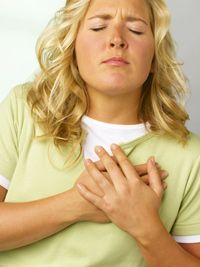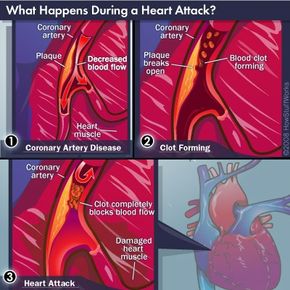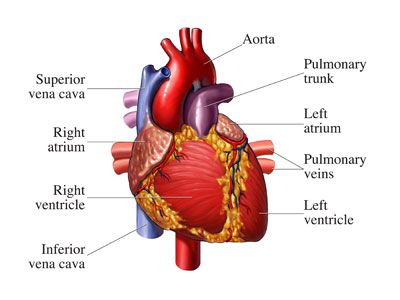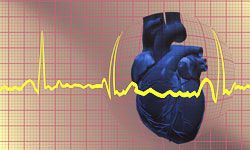Like all muscles and tissues, your heart needs oxygen to live. A few minutes without that precious supply of bloodborne oxygen and your heart tissue begins to die. But here's the surprising part: Often it's not the lifetime of worsening traffic congestion in your arteries stemming from coronary heart disease (or atherosclerosis) that kills you, although CHD is an alarming condition in its own right. It's that five-minute pothole patch that does you in.
Here's how it works. Let's say you nick your arm. Platelets in your bloodstream rush to the cut, clump together and harden. Soon, a bumpy scab appears from the platelets, plasma and fibrin that worked to keep you from bleeding to death (or spotting on your shirtsleeve).
The same process often happens inside the body during a heart attack. A piece of plaque, maybe 40 years in the making, gets knocked around by materials whizzing by in the bloodstream and ruptures. Fast-acting platelets arrive at the scene, pile on and form a clot. In minutes, it does what a lifetime of plaque and cholesterol didn't: It blocks your artery, starving heart muscle of oxygen and causing tissue death. This is your heart attack.
The dire condition of your heart doesn't go unnoticed by the rest of your body. Earning its name, the nervous system freaks out when it realizes what's going on. It kicks the rest of your body into "fight or flight" mode. You begin sweating, your skin feels clammy and your heart rate increases. Your nervous system makes you feel nauseated and weak. You're either having a heart attack or listening to the morning's traffic report.
These side effects don't seem very helpful, but they may save your sweaty life. Researchers have found that heart attack victims who sweat profusely are more likely to seek immediate treatment, and thus have a higher rate of survival than people who simply "glow" during their heart attacks [source: WebMD].
In addition to backing up traffic in the blocked artery, your heart attack also is affecting nearby roads, leading you to feel pain in your jaw, arm or elsewhere. Why is this? The sensation of pain travels from the source (your heart) to your spinal cord. When these pain signals reach the spinal cord, many of them merge onto the same nerve pathway. So, even though your jaw is perfectly fine, your brain has interpreted part of the heart's pain signal to be a call for help from the jaw. This is called referred pain.
Your heart attack backs up traffic in your lungs as well. Your ticker is too busy trying to save its own life to worry about effectively pumping blood to the rest of the body. Some of that fluid stagnates in your lungs, leaving you nearly breathless.
While you're sweating, rubbing your aching arm and falling apart, your heart cells are gasping for oxygen. Receiving none, they die, and they're not coming back. If your heart has stopped beating entirely, your brain cells will die off in about three to seven minutes. Oddly, bone and skin cells can survive for several days [source: Macnair]. Without medical assistance, you'll eventually die from heart failure (not pumping enough blood to the rest of the body) or ventricular fibrillation (a deadly arrhythmia that causes your heart to stop beating).
If you made it to the hospital in time and your heart is still functioning, congratulations. Your heart begins healing almost immediately. The dead tissue, though, becomes scar tissue, and that part of the heart will never work as well again. From now on, traffic will always be slower, but it beats crawling inside the Great Orange Construction Barrel in the Sky.
To learn more about avoiding that fate, keep reading -- there are lots more heart articles on the next page.



